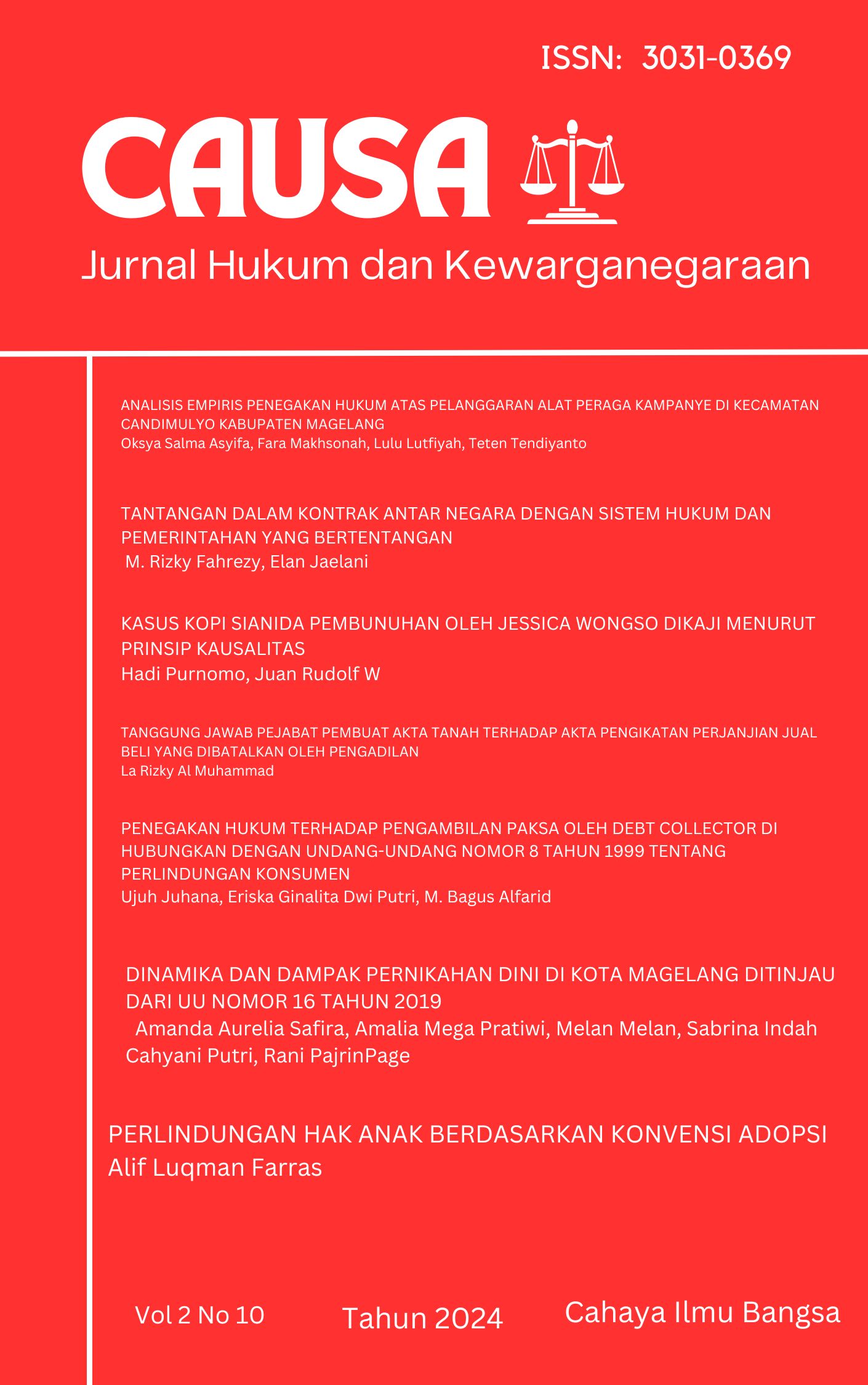WASIAT WAJIBAH DALAM HUKUM KEWARISAN ISLAM: ANALISIS PUTUSAN PA SURABAYA NOMOR 2331/PDT.P/2024/PA.SBY
- Authors
-
-
Haidar Muhamad Ali
Universitas 17 Agustus 1945 SurabayaAuthor
-
- Keywords:
- Mandatory Will (Wasiat Wajibah), Islamic Inheritance Law, Compilation of Islamic Law (KHI), Multi-religious Family, Religious Court (PA), Progressive Ijtihad
- Abstract
-
This study analyzes the application of the mandatory will (wasiat wajibah) concept in the Surabaya Religious Court Decision No. 2331/Pdt.P/2024/PA.Sby regarding the estate division of the deceased Rusmijati Binti Moestopo from a multi-religious family. Through normative legal research employing statutory, conceptual, and case approaches, the research examines the decision’s alignment with Indonesia’s Compilation of Islamic Law (KHI) and classical/contemporary scholarly perspectives. Key findings indicate: Implementation Mechanism: The court allocated 2/3 of the estate to 12 Muslim heirs under faraidh rules and 1/3 to 6 non-Muslim relatives via wasiat wajibah – adhering to the 1/3 cap under KHI Articles 195(2) and 209. Conformity with KHI: The ruling prioritizes Muslim heirs per Islamic inheritance principles while utilizing wasiat wajibah as an equitable instrument for excluded non-Muslim kin, despite KHI’s lack of explicit provisions for interfaith cases. Scholarly Divergence: Supported by contemporary jurists (e.g., Sheikh Ali Jum’ah, A. Djazuli) emphasizing substantive justice, but contested by classical Shafi’i scholarship prohibiting cross-religious inheritance. The decision exemplifies progressive ijtihad within Indonesia’s Islamic legal system, balancing sharia compliance with socio-legal realities in pluralistic societies. It recommends explicit KHI revisions governing wasiat wajibah for non-Muslims to prevent juridical ambiguity.
Keywords: Mandatory Will (Wasiat Wajibah), Islamic Inheritance Law, Compilation of Islamic Law (KHI), Multi-religious Family, Religious Court (PA), Progressive Ijtihad.
- Author Biography
- Downloads
- Published
- 2025-06-20
- Section
- Articles
How to Cite
Similar Articles
- Muhamad Soli , Habibi Al Amin , POTENSI KONFLIK DALAM TRADISI PERKAWINAN ETNIS MADURA PERSPEKTIF MASLAHAH MURSALAH (Studi Kasus Uang Asap Pada Keluarga Madura Desa Sutera Kecamatan Sukadana Kabupaten Kayong Utara) , Causa: Jurnal Hukum dan Kewarganegaraan: Vol. 14 No. 5 (2025): Causa: Jurnal Hukum dan Kewarganegaraan
- Muhammad Ardaneswari, Trio Hendriansyah, Panji Setiyawan Wicaksono, Najwa Soraya Nurhaliza, Jihan Alifah, Fina Najihatussa`adah, KAJIAN TERHADAP PERKARA PERSIDANGAN DI PENGADILAN AGAMA CIREBON, STUDI PERKARA PERCERAIAN DAN ISBAT ANAK , Causa: Jurnal Hukum dan Kewarganegaraan: Vol. 15 No. 3 (2025): Causa: Jurnal Hukum dan Kewarganegaraan
- Nazwa Defa, Baidhowi Baidhowi, Analisis Hukum Syariah Terhadap Mekanisme Pembiayaan Mudharabah dalam Lembaga Keuangan Syariah , Causa: Jurnal Hukum dan Kewarganegaraan: Vol. 15 No. 4 (2025): Causa: Jurnal Hukum dan Kewarganegaraan
- Junaedi Hasyim, Rahmatiah, Andi Muhammad Akmal, HUKUM ISLAM DALAM BIDANG EKONOMI (IQTISHADIYYAH) DI INDONESIA , Causa: Jurnal Hukum dan Kewarganegaraan: Vol. 15 No. 3 (2025): Causa: Jurnal Hukum dan Kewarganegaraan
- Aditya Gilang Rifai, Romi Faslah, TINDAK PIDANA PENCUCIAN UANG DALAM PERSPEKTIF HUKUM POSITIF DAN ISLAM: ANALISIS TEORETIS DAN STUDI KASUS DI INDONESIA , Causa: Jurnal Hukum dan Kewarganegaraan: Vol. 14 No. 5 (2025): Causa: Jurnal Hukum dan Kewarganegaraan
- Anneke Mawlidya, PERANAN HUKUM KEDOKTERAN FORENSIK DALAM PENEGAKAN HUKUM DI INDONESIA , Causa: Jurnal Hukum dan Kewarganegaraan: Vol. 13 No. 1 (2025): Causa: Jurnal Hukum dan Kewarganegaraan
- Dzauraz Zidnan R, Fajar Agus H, Muhammad Afif F, Eksanudin, Tegar Harbriyana P, PENEGAKAN HUKUM TERHADAP TINDAK PIDANA TERORISME DALAM PERSPEKTIF HAK ASASI MANUSIA DI INDONESIA , Causa: Jurnal Hukum dan Kewarganegaraan: Vol. 14 No. 2 (2025): Causa: Jurnal Hukum dan Kewarganegaraan
- Adna Vika Aristiyani, IMPLIKASI PERUBAHAN UNDANG-UNDANNG CIPTA KERJA TERHADAP REGULASI PERSEROAN TERBATAS , Causa: Jurnal Hukum dan Kewarganegaraan: Vol. 15 No. 1 (2025): Causa: Jurnal Hukum dan Kewarganegaraan
- Astu Asmawati, Dian Eka Prastiwi, Chika Antonia, Chanda Alfira, TINJAUAN YURIDIS TERHADAP EFEKTIVITAS SANKSI ADMINISTRATIF DALAM PENEGAKAN HUKUM PAJAK DI INDONESIA , Causa: Jurnal Hukum dan Kewarganegaraan: Vol. 13 No. 4 (2025): Causa: Jurnal Hukum dan Kewarganegaraan
- Muhammad Yasin, Masrokhin Masrokhin, DENDA ADAT SETELAH PERCERAIAN PADA MASYARAKAT LAMPUNG PEPADUN (STUDI KASUS DI DESA KAGUNGAN RATU KECAMATAN TULANG BAWANG UDIK KABUPATEN TULANG BAWANG BARAT) , Causa: Jurnal Hukum dan Kewarganegaraan: Vol. 14 No. 8 (2025): Causa: Jurnal Hukum dan Kewarganegaraan
You may also start an advanced similarity search for this article.

